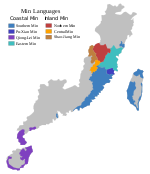Swatow dialect
| Swatow dialect | |
|---|---|
| Shantou | |
| 汕頭話 Suan¹tao⁵ uê⁷ | |
| Native to | China |
| Region | Mainly in Shantou, southeastern Guangdong province. |
Early forms | |
| Peng'im | |
| Language codes | |
| ISO 639-3 | – |
| Glottolog | shan1244 |
| Linguasphere | 79-AAA-jif |
 Shantou dialect | |
The Swatow dialect, or in Mandarin the Shantou dialect, is a Chinese dialect mostly spoken in Shantou in Guangdong, China. It is a dialect of Chaoshan Min language.[4] It is similar to and largely mutually intelligible with the Teochew dialect.
Phonology
Shantou dialect has 18 initials, 61 rimes and 8 tones.
Initials
| Bilabial | Alveolar | Velar | Glottal | |||
|---|---|---|---|---|---|---|
| plain | sibilant | |||||
| Nasal | /m/ 毛 |
/n/ 腦 |
/ŋ/ 俄 |
|||
| Plosive/ Affricate |
tenuis | /p/ 波 |
/t/ 刀 |
/ts/ 之 |
/k/ 哥 |
/ʔ/ 烏 |
| aspirated | /pʰ/ 抱 |
/tʰ/ 天 |
/tsʰ/ 此 |
/kʰ/ 戈 |
||
| voiced | /b/ 無 |
/g/ 鵝 |
||||
| Continuant | voiceless | /s/ 思 |
||||
| voiced | /l/ 羅 |
/z/ 入 |
/h/ 何 | |||
Rimes
| i 衣 |
u 污 | |
| a 亞 |
ia 呀 |
ua 娃 |
| o 窩 |
io 腰 |
|
| e 啞 |
ue 鍋 | |
| ɯ 余 |
||
| ai 哀 |
uai 歪 | |
| oi 鞋 |
ui 威 | |
| au 歐 |
iau 夭 |
|
| ou 烏 |
iu 憂 |
|
| ĩ 丸 |
||
| ã 噯 |
ĩã 營 |
uã 鞍 |
| ĩõ 羊 |
||
| ẽ 楹 |
||
| ɯ̃ 秧 |
||
| ãĩ 愛 |
||
| õĩ 閑 |
||
| im 音 |
||
| am 庵 |
iam 淹 |
|
| iŋ 因 |
uŋ 溫 | |
| aŋ 按 |
iaŋ 央 |
uaŋ 汪 |
| oŋ 翁 |
ioŋ 雍 |
|
| eŋ 英 |
||
| ɤŋ 恩 |
||
| iʔ 裂 |
||
| aʔ 鴨 |
iaʔ 益 |
uaʔ 呴 |
| oʔ 學 |
ioʔ 約 |
|
| eʔ 厄 |
||
| oiʔ 狹 |
iuʔ | |
| ip̚ 邑 |
||
| ap̚ 盒 |
iap̚ 壓 |
uap̚ 法 |
| ik̚ 乙 |
uk̚ 熨 | |
| ak̚ 惡 |
iak̚ 躍 |
uak̚ 獲 |
| ok̚ 屋 |
iok̚ 育 |
|
| ek̚ 液 |
||
| m̩ 唔 |
Tones
| No. | 1 | 2 | 3 | 4 | 5 | 6 | 7 | 8 |
|---|---|---|---|---|---|---|---|---|
| Tones | dark level 陰平 |
dark rising 陰上 |
dark departing 陰去 |
dark entering 陰入 |
light level 陽平 |
light rising 陽上 |
light departing 陽去 |
light entering 陽入 |
| Tone contour | ˧ (33) | ˥˧ (53) | ˨˩˧ (213) | ˨ (2) | ˥ (55) | ˧˥ (35) | ˩ (11) | ˥ (5) |
| Example Hanzi | 詩 | 死 | 四 | 薛 | 時 | 是 | 示 | 蝕 |
Tone sandhi
Shantou dialect has extremely extensive tone sandhi rules: in an utterance, only the last syllable pronounced is not affected by the rules. The two-syllable tonal sandhi rules are shown in the table below:
| Original citation tone | Tone sandhi |
|---|---|
| dark level 33 |
23 |
| light level 55 |
21 |
| dark rising 53 |
35 |
| light rising 35 |
21 |
| dark departing 213 |
55 |
| light departing 11 |
12 |
| dark entering 2 |
5 |
| light entering 5 |
2 |
Notes
References
- ^ Mei, Tsu-lin (1970), "Tones and prosody in Middle Chinese and the origin of the rising tone", Harvard Journal of Asiatic Studies, 30: 86–110, doi:10.2307/2718766, JSTOR 2718766
- ^ Pulleyblank, Edwin G. (1984), Middle Chinese: A study in Historical Phonology, Vancouver: University of British Columbia Press, p. 3, ISBN 978-0-7748-0192-8
- ^ Hammarström, Harald; Forkel, Robert; Haspelmath, Martin; Bank, Sebastian (2023-07-10). "Glottolog 4.8 - Min". Glottolog. Leipzig: Max Planck Institute for Evolutionary Anthropology. doi:10.5281/zenodo.7398962. Archived from the original on 2023-10-13. Retrieved 2023-10-13.
- ^ Shantou Dialect entry in Glossika
- Office of Chorography of Shantou City 汕头市地方志办公室 (1999). Shan tou shi zhi 汕头市志 ["Chorography of Shantou City"]. Vol. 72. Beijing: Xinhua chubanshe 新华出版社 ["Xinhua Publishing House"]. ISBN 9787501143870.
Further reading
- Fielde, Adele M. (1883). A pronouncing and defining dictionary of the Swatow dialect, arranged according to syllables and tones. Shanghai: American Presbyterian Mission Press. Retrieved 2015-04-01.
- Fielde, Adele M. (1878). First Lessons in the Swatow Dialect. Swatow: Swatow Printing Office Company. Retrieved 2015-04-01.
- Lechler, Rudolf, Samuel Wells Williams , William Duffus (1883). English-Chinese Vocabulary of the Vernacular or Spoken Language of Swatow. Swatow: English Presbyterian Mission Press. Retrieved 2015-04-01.
{{cite book}}: CS1 maint: multiple names: authors list (link) - Hsiung-chʻêng, Lin (1886). A handbook of the Swatow vernacular. Singapore: Koh Yew Hean Press. Retrieved 2015-04-01.
External links
 Media related to Shantou dialect at Wikimedia Commons
Media related to Shantou dialect at Wikimedia Commons



